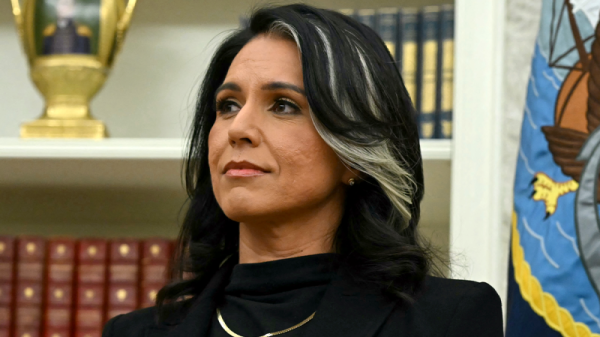Charles O. Jones, a dean of American political scientists who was known for the expertise and insight he brought to the study of Congress and the presidency, died Jan. 3 at a hospice center in Fishersville, Va. He was 92.
The cause was complications from a stroke, said his son Daniel Jones.
Dr. Jones, an emeritus professor at the University of Wisconsin at Madison, devoted decades to explaining the American democratic process — why citizens vote as they do, how politicians wield or fail to wield their power while in office, and how the branches of government interact.
He was sought after far beyond academic circles, becoming a go-to source for political reporters and a familiar face to C-SPAN junkies. Norman J. Ornstein, an emeritus scholar at the American Enterprise Institute in Washington, described Dr. Jones as “one of the premier scholars of his generation.”
Dr. Jones’s career coincided with the Democratic majority in the U.S. House of Representatives that lasted four decades, from 1955 to 1995. As a Republican — but never a partisan — he was “more sensitive” to the role of the minority party, Ornstein said.
His hallmark, Ornstein said, was “careful, reasoned and insightful theses built on his expertise and on data.” He cited Dr. Jones’s 1970 book “The Minority Party in Congress” as “seminal.”
Dr. Jones was equally known as a scholar of the presidency, with books including “The Presidency in a Separated System” (1994), “Separate but Equal Branches: Congress and the Presidency” (1995) and “Passages to the Presidency: From Campaigning to Governing” (1998). He also wrote book-length studies of the White House tenures of Jimmy Carter, Ronald Reagan and Bill Clinton.
Reporters on deadline often came to Dr. Jones for analysis of contemporary events as well as for historical context. He once observed that part of the legacy of the Watergate affair, which drove President Richard M. Nixon from office in 1974, was the erasure of the belief among many Americans that such a scandal was not possible in the White House.
“Post-Watergate,” he told a New York Times reporter in 2002, “we come to believe that it could be as bad as we think.”
Charles Oscar Jones was born in Worthing, S.D., close to the Iowa border, on Oct. 28, 1931, one of six children. The family moved frequently as his father, a Congregationalist minister, struggled to find work. His mother was a homemaker.
Dr. Jones recalled being physically abused by both his parents and by age 12 saved up enough money from his paper route to run away from home, which at the time was in rural Iowa.
In a self-published memoir, Dr. Jones recounted that he stuffed his “few belongings in a pillowcase” and traveled by bus as far as Dallas, where he was arrested as a runaway.
When his parents declined to send the funds necessary to bring him home, his paternal grandparents provided for him to make his way to Canton, S.D., where they lived, and where he spent the rest of his adolescence.
The details of his odyssey escaped his memory, Dr. Jones wrote in his memoir. But what remained “crystal clear” in his mind was the “feeling of security” when he reached his grandparents.
“I was safe and secure with family who loved me,” he remembered.
Dr. Jones received a bachelor’s degree in political science from the University of South Dakota in 1953. After Army service, he continued his studies at the University of Wisconsin at Madison, where he received a master’s degree in 1956 and a PhD in 1960. His early books included “The Republican Party in American Politics” (1965).
Dr. Jones taught at Wellesley College in Massachusetts, the University of Arizona and the University of Pittsburgh before he joined the University of Virginia faculty in 1981. He returned to the University of Wisconsin in 1988, became chairman of the political science department, and took emeritus status in 1997.
He was a scholar at the Brookings Institution and the presidential oral history program at the Miller Center, an affiliate of U-Va. centered on presidential scholarship and public policy.
Survivors include his wife of 64 years, the former Vera Mire of Wintergreen, Va.; two sons, Joe B. Jones of Rapid City, S.D., and Daniel Jones of New York City and Accord, N.Y.; two brothers; a sister; and three grandchildren.
Dr. Jones served as president of the American Political Science Association and editor of the American Political Science Review. In contrast with other seasoned academics who jealously guarded their own status, Ornstein said, Dr. Jones was known for “bringing in the younger scholars and making them feel wanted, worthy and at home.”
As for the political reporters — as one of them recalled after his death — he “always had time for scribes.”
Charles O. Jones, a dean of American political scientists who was known for the expertise and insight he brought to the study of Congress and the presidency, died Jan. 3 at a hospice center in Fishersville, Va. He was 92.
The cause was complications from a stroke, said his son Daniel Jones.
Dr. Jones, an emeritus professor at the University of Wisconsin at Madison, devoted decades to explaining the American democratic process — why citizens vote as they do, how politicians wield or fail to wield their power while in office, and how the branches of government interact.
He was sought after far beyond academic circles, becoming a go-to source for political reporters and a familiar face to C-SPAN junkies. Norman J. Ornstein, an emeritus scholar at the American Enterprise Institute in Washington, described Dr. Jones as “one of the premier scholars of his generation.”
Dr. Jones’s career coincided with the Democratic majority in the U.S. House of Representatives that lasted four decades, from 1955 to 1995. As a Republican — but never a partisan — he was “more sensitive” to the role of the minority party, Ornstein said.
His hallmark, Ornstein said, was “careful, reasoned and insightful theses built on his expertise and on data.” He cited Dr. Jones’s 1970 book “The Minority Party in Congress” as “seminal.”
Dr. Jones was equally known as a scholar of the presidency, with books including “The Presidency in a Separated System” (1994), “Separate but Equal Branches: Congress and the Presidency” (1995) and “Passages to the Presidency: From Campaigning to Governing” (1998). He also wrote book-length studies of the White House tenures of Jimmy Carter, Ronald Reagan and Bill Clinton.
Reporters on deadline often came to Dr. Jones for analysis of contemporary events as well as for historical context. He once observed that part of the legacy of the Watergate affair, which drove President Richard M. Nixon from office in 1974, was the erasure of the belief among many Americans that such a scandal was not possible in the White House.
“Post-Watergate,” he told a New York Times reporter in 2002, “we come to believe that it could be as bad as we think.”
Charles Oscar Jones was born in Worthing, S.D., close to the Iowa border, on Oct. 28, 1931, one of six children. The family moved frequently as his father, a Congregationalist minister, struggled to find work. His mother was a homemaker.
Dr. Jones recalled being physically abused by both his parents and by age 12 saved up enough money from his paper route to run away from home, which at the time was in rural Iowa.
In a self-published memoir, Dr. Jones recounted that he stuffed his “few belongings in a pillowcase” and traveled by bus as far as Dallas, where he was arrested as a runaway.
When his parents declined to send the funds necessary to bring him home, his paternal grandparents provided for him to make his way to Canton, S.D., where they lived, and where he spent the rest of his adolescence.
The details of his odyssey escaped his memory, Dr. Jones wrote in his memoir. But what remained “crystal clear” in his mind was the “feeling of security” when he reached his grandparents.
“I was safe and secure with family who loved me,” he remembered.
Dr. Jones received a bachelor’s degree in political science from the University of South Dakota in 1953. After Army service, he continued his studies at the University of Wisconsin at Madison, where he received a master’s degree in 1956 and a PhD in 1960. His early books included “The Republican Party in American Politics” (1965).
Dr. Jones taught at Wellesley College in Massachusetts, the University of Arizona and the University of Pittsburgh before he joined the University of Virginia faculty in 1981. He returned to the University of Wisconsin in 1988, became chairman of the political science department, and took emeritus status in 1997.
He was a scholar at the Brookings Institution and the presidential oral history program at the Miller Center, an affiliate of U-Va. centered on presidential scholarship and public policy.
Survivors include his wife of 64 years, the former Vera Mire of Wintergreen, Va.; two sons, Joe B. Jones of Rapid City, S.D., and Daniel Jones of New York City and Accord, N.Y.; two brothers; a sister; and three grandchildren.
Dr. Jones served as president of the American Political Science Association and editor of the American Political Science Review. In contrast with other seasoned academics who jealously guarded their own status, Ornstein said, Dr. Jones was known for “bringing in the younger scholars and making them feel wanted, worthy and at home.”
As for the political reporters — as one of them recalled after his death — he “always had time for scribes.”





















